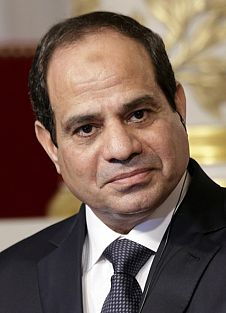Former Field Marshal Abdel Fattah Saeed El-Sisi was sworn into office as the 6th President of Egypt on 8 June 2014, having earlier that year resigned from his post as the Commander-in-Chief of the Egyptian Armed Forces. As a civilian, and as Deputy Prime Minister, Sisi won the presidential elections held in May 2014.
Birth: 19 November 1954 (Age: 71)
Source of Influence: Political
Influence: President of Egypt
School of Thought: Sunni, Traditional Sunni
Status: Featured in current year
Former Field Marshal Abdel Fattah Saeed El-Sisi was sworn into office as the 6th President of Egypt on 8 June 2014, having earlier that year resigned from his post as the Commander-in-Chief of the Egyptian Armed Forces. As a civilian, and as Deputy Prime Minister, Sisi won the presidential elections held in May 2014.
Post-Arab Spring: Former Field Marshal Abdel Fattah Saeed El-Sisi removed Egypt’s first democratically elected president (Mohamed Morsi (d. 2019)) from power in 2013 in response to street protests against the Muslim Brotherhood-led government. Outbreaks of violence ensued across Egypt that included the death of many hundreds of protesters at the hands of pro-military police at the Raba’a Al-Adawiya Square in Cairo. Sisi then ran for office himself and was sworn into office as President of Egypt on 8 June 2014. Sisi secured a third six-year term, winning 89.6% of the vote in the December 2023 election. This victory extends Sis’s presidency until 2030, after which he is constitutionally barred from running again.
Challenges: Under Sisi’s leadership, Egypt has faced mounting economic difficulties. Inflation has moderated to 12% (from a peak of 26% in 2024), the Egyptian pound has plummeted (from 7 pounds per US dollar in 2014 to 48 in 2024), and the country is saddled with an international debt of more than $157 billion. Ordinary Egyptians face rising food prices, unemployment, and declining living standards. Human rights organisations estimate that Egypt holds between 65,000 and 70,000 political prisoners, adding pressure from international watchdogs concerned with governance and rule of law.
Mega Projects: Since taking power in 2014, President Abdel Fattah El-Sisi has pushed massive projects to modernise Egypt and boost its economy. The standout is the New Administrative Capital, a $58 billion smart city 30 miles east of Cairo, designed to house 6.5 million people with sleek government buildings, Africa’s tallest tower, and the region’s largest mosque and cathedral. By mid-2025, some ministries moved in, and Sisi held his third-term inauguration there in 2024. Another project, the ‘New Delta’, aims to turn 2.5 million acres of desert west of the Nile into farmland, with a sustainable city called Mostaqbal Misr to help feed Egypt. On the Mediterranean coast, Ras El Hekma, a $35 billion tourism hub funded by the UAE, began construction in 2025 to draw visitors. Also, the $30 billion El Dabaa Nuclear Power Plant, mostly paid for by Russia, is progressing to deliver clean energy by 2030.
The Gaza Genocide: Since Israel’s military campaign against Gaza escalated in late 2023, Egypt has played a pivotal role in humanitarian and diplomatic efforts. The Rafah Border Crossing has served as the primary entry point for humanitarian aid into Gaza, though Cairo has resisted pressure to allow mass displacement of Palestinians into Sinai, citing security concerns and the risk of permanently altering Gaza’s demographics. Egypt, along with Qatar and Jordan, has spearheaded ceasefire negotiations between Israel and Hamas, though progress has been slow. Politically, Sisi has condemned Israeli actions as disproportionate and called for the protection of Palestinian civilians, aligning Egypt with the Arab League’s position and South Africa’s genocide case against Israel at the International Court of Justice.
“I would never stay in office against the will of the people. My ethics and patriotism do not allow me to do so”
6th president of Egypt
118.4 million population of Egypt
News about Abdel Fattah El-Sisi
- No approved news items yet.



